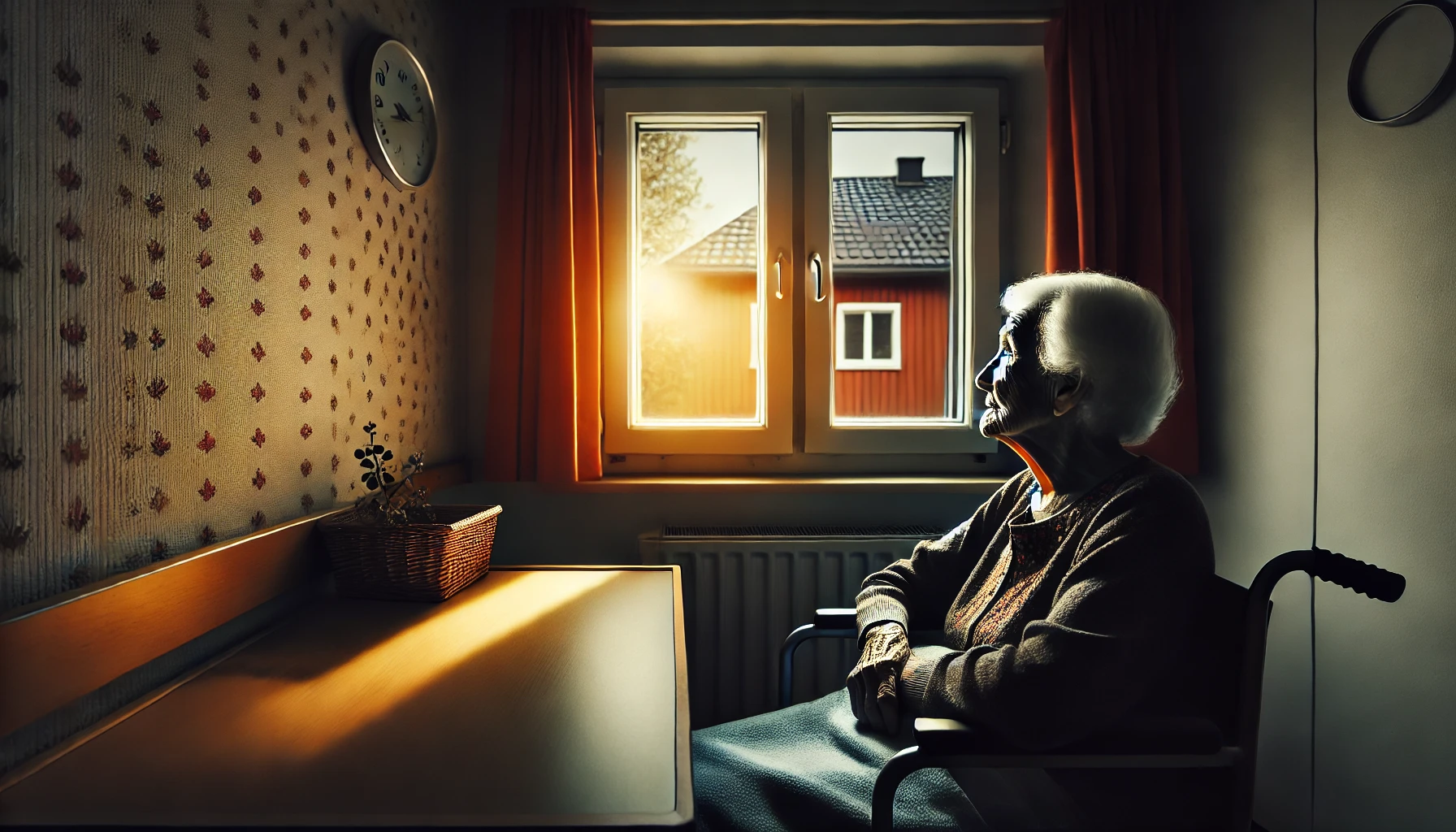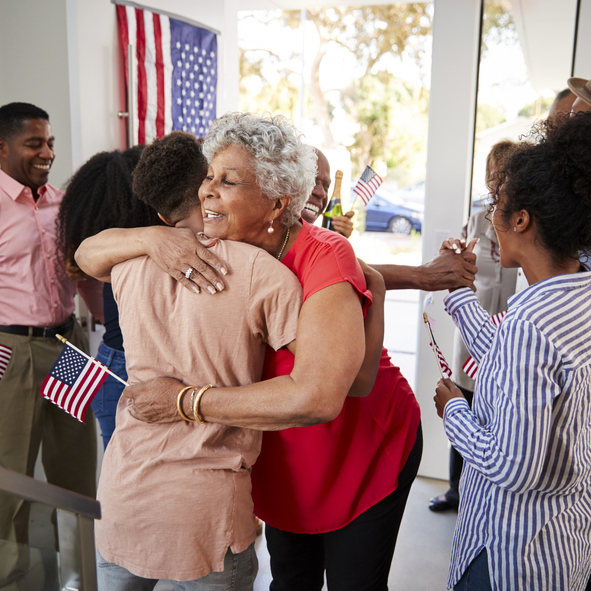“The emotional pain I feel is far greater than any physical pain that I feel.”
I will never forget hearing this. I had asked a woman in a nursing home about her experience living there; that was her response. Visiting people in nursing homes can open your eyes to just how deeply we need to feel connected with others. When that connection is removed or hampered, the pain, while not visible, strikes at the very core of our being. One’s chest aches with the void of feeling forgotten, invisible, and lost.
The video “Real Phone Calls to the UK’s Minister of Loneliness” documents how loneliness has plagued our modern world, showcasing anonymous voicemails to the minister left by citizens suffering from social deprivation. Watching it is what inspired me to write this article. Listening to all those messages left on that answering machine gripped my heart… I wondered if anyone ever called back; Feelings of desperation, hopelessness, sadness, and melancholy washed over me. I was deeply reminded of the times I experienced that pain or witnessed it in the people I have visited…
As I listened, the phrase “…loneliness sucks,” came to mind. Loneliness is painful. It’s deadly. It sucks.
Each of the following headings is a quote from someone who called The Minister of Loneliness and left a voicemail.
“I don’t have anyone to share my experience with.”
Living in a nursing home can be really lonely. When people don’t have anyone to talk to or share their thoughts with, they start feeling isolated and sad. Research from the National Institute on Aging shows that being lonely can make people feel more depressed and anxious. For those in nursing homes, this is a big problem because they already have a lot of health issues to deal with. Loneliness can make these issues worse and lead to a decline in overall health. In fact, it can lead to one’s premature death. It’s become common knowledge that loneliness can be harmful to one’s health as much as smoking 15 cigarettes a day. It is more damaging than obesity.
In short, loneliness is deadly.
“Being lonely makes it feel like no one really knows you, and if you just disappeared, there would be no real record of who you were.”
Imagine feeling like you don’t matter to anyone. That’s what loneliness makes you believe… It would be easy for an isolated nursing home resident to assume that no one would notice if they disappeared.
More than once, I’ve been asked by someone living in a nursing home, “Why am I still here? Why doesn’t God just take me home?”
The American Psychological Association says that this type of loneliness can worsen symptoms of depression, especially if they already feel forgotten by society at large. Imagine how harmful that feeling of invisibility can be in a nursing home setting, where residents may feel cut off from their previous lives, without identities and communities.
Loneliness erases you.
“I think that maybe I would self-harm because I want it to be recorded: this sort of pain inside that takes so much of my time, and I want it to be shown physically so you can see it. And so, it’s not only in my head.”
Sometimes, when you feel like you’ve been erased, you’ll do anything to be seen again. Sometimes, people in nursing homes feel so lonely that they decide to hurt themselves to show others their pain. According to The Mayo Clinic, self-harm is a method some people use to try to cope with their feelings. It’s a cry for help and shows they need support right away. This is why paying attention to the mental health of nursing home residents is so important. Providing mental health support and ensuring that residents have someone to talk to can help prevent these feelings from escalating.
Loneliness hurts.
“You wonder who else is feeling this. It’s difficult to think you’re not the only one.”
When you feel lonely, it’s easy to think you’re the only one going through it. But actually, many people feel the same way. The Campaign to End Loneliness reports that millions of people always feel lonely. Raising awareness about this social epidemic can help people in nursing homes feel less alone and more connected. Understanding that others share their feelings can provide comfort and encourage residents to reach out and form connections.
L o n e l i n e s s———-i s o l a t e s.
“I was just sitting in my flat watching people walk by and thinking, ‘How I am so alone in a place where there are so many people?’”
Living in a nursing home can feel weird because you are surrounded by people and yet still feel completely alone. This is a common problem in big cities, too, and is called urban loneliness.
The World Health Organization says we need to create more inclusive communities to help people feel less alone. This is super important in nursing homes where residents can feel left out. Creating a sense of community within the home can help residents feel more included and less isolated.
Loneliness isolates even in crowds.
“… I’ve definitely felt the impact of not having any physical face-to-face contact with people; you just feel alone… and some days it’s worse than the others.”
Not having face-to-face contact can really mess with your mood. During the COVID-19 pandemic, this became even more obvious. For people in nursing homes, not being able to see family or friends can destroy their happiness and wellbeing. And conversely, studies from the University of California, Berkeley, show that face-to-face interactions help people feel better and less stressed. It’s crucial for nursing home residents to have regular visitors. Video calls and other virtual interactions can help, but nothing replaces the value of in-person contact.
Loneliness thrives without contact.
“You do everything to keep your mind occupied.”
People in nursing homes often try to keep busy to distract themselves from their isolation. But while staying busy can help temporarily, it doesn’t solve the real problem. The Journal of Health Psychology argues that meaningful activities can help reduce loneliness. Nursing homes must offer fun and engaging activities to keep residents happy and mentally healthy. Activities should be varied and cater to the interests of the residents to keep them genuinely engaged.
Loneliness hides behind busy work.
“It really makes you think, ‘Who else is feeling like this?’ and it’s so difficult to think to yourself, ‘I’m not the only one.'”
In nursing homes, it’s important to create a sense of community so residents don’t feel isolated. The National Institutes of Health says we need to tackle loneliness as a serious health issue, especially in places like nursing homes where it’s so common. Group activities, social events, and communal areas can help foster connections and reduce feelings of isolation.
Loneliness is an enemy we all have in common.
“People who are feeling lonely, as soon as someone says ‘Hello’ to them, then that can bring so much happiness and joy, and you can automatically feel so much more connected with yourself and everyone else.”
Organizations like the National Association of Long-Term Care Volunteers (NALTCV) work to get more volunteers into nursing homes to help combat loneliness. These volunteers can bring joy and companionship to residents, making a huge positive impact on their lives. Regular visits and consistent interaction can significantly improve the well-being of nursing home residents.
A simple “hello” can make an enormous difference.
Volunteers heal loneliness.
Volunteers: For more information about how you can make a difference in someone’s life,
Visit: https://NALTCV.org/new-volunteers
Responsible for managing volunteers in your long-term care community? The NALTCV is here to support you.
Contact us at Info@NALTCV.org and tell us how we can help you.
.
Sources:
- Adey, A. (2018). Real phone calls to the UK’s Minister of Loneliness [Video]. YouTube. https://www.youtube.com/watch?v=EuWUjLocHrI
- Campaign to End Loneliness. (2021). Facts and statistics about loneliness. https://www.campaigntoendloneliness.org/facts-and-statistics/
- Holt-Lunstad, J., Smith, T. B., Baker, M., Harris, T., & Stephenson, D. (2015). Loneliness and Social Isolation as Risk Factors for Mortality: A Meta-Analytic Review. Perspectives on Psychological Science, 10(2), 227-237. https://doi.org/10.1177/1745691614568352
- Mayo Clinic. (2020). Self-injury/cutting. https://www.mayoclinic.org/diseases- conditions/self-injury/symptoms-causes/syc-20350950
- National Institute on Aging. (2019). Social isolation, loneliness in older people pose health risks. https://www.nia.nih.gov/news/social-isolation-loneliness-older-people- pose-health-risks
- Sacco, D., & Ismail, M. (2014). Social belongingness satisfaction as a function of interaction medium: Face-to-face interactions facilitate greater social belonging and interaction enjoyment compared to instant messaging. Computers in Human Behavior, 36, 359-364. https://doi.org/10.1016/j.chb.2014.04.004
- Varacallo, P. (2023, October 17). Feeling this emotion too often can lead to premature death, says new study. The Healthy. Accessed July 25, 2024 https://www.thehealthy.com/mental-health/news-loneliness-mortality-risk-june-2023- study/
- Zhaoyang, R., Harrington, K. D., Scott, S. B., Graham-Engeland, J. E., & Sliwinski, M. J. (2022). Daily Social Interactions and Momentary Loneliness: The Role of Trait Loneliness and Neuroticism. The Journals of Gerontology: Series B, (77)10, 1791-1802 https://doi.org/10.1093/geronb/bbac083




